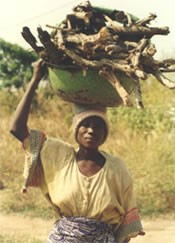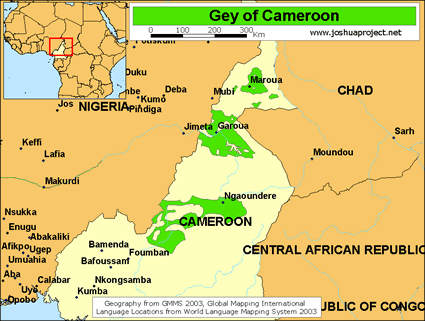Historically, the Fulani (AKA, Fula or Fulbe) are a nomadic people who traveled from one region to another, seeking water for their cattle herds. After migrating from North Africa or the Middle East, they gradually spread eastward (over a 1000-year period from A. D. 900 to 1900), from Senegal and Guinea to as far as Sudan. During their wanderings, they conquered many less powerful tribes.
The Fulani are comprised of a number of distinct sub-groups who live across a huge swath of central and western Africa, from Senegal in the west and to Sudan in the east. They are bounded in the north by the Sahara Desert and live no further south than Cameroon and the Central African Republic. They are grouped and named according to their location, occupation and dialect of their widely spoken language. Accordingly, there are five major groups of Fulani: the Fula Toro, Fulakunda, Fulfulde, Fuuta Jalon, and Tukolor. The Fulbe Gey are one of the minor subgroups and they speak the Adamawa language. They live only in Cameroon.
Many Fulani completely or partially abandoned their traditional nomadic life in favor of a sedentary existence in towns or on farms among the conquered peoples. In today's world, these settled Fulani are in the majority. The Fulbe Gey include both settled and semi-nomadic people. The semi-nomadic Fulbe Gey revolve their lives around these seasons, and around a strict division of labor based on gender. During the wet season, the cattle, sheep, and goats remain at a permanent settlement where they are herded by the men and boys, but usually milked and cared for by the women and girls. The men plant, care for and harvest the crops which mostly consist of millet, rice, and peanuts. They also build fences to keep livestock from wandering.
Meanwhile, the women spend four to five hours each afternoon preparing the evening meal, but only after fetching water, wood and millet. Besides this arduous task, females must maintain huts, weave mats, spin cotton, make soap, and care for young children. During the dry season, the Fulbe Gey practice the nomadic part of their existence. Rather than risking the exhaustion of the village water supply, the young men leave the older men, the women, and the children in the village and take the cattle on a search for alternative water supplies until the rainy season approaches. These nomadic bands camp in portable shelters of poles or branches covered with straw, leaves or mats. They are noted for their storytelling and proverbs which attempt to teach valuable lessons about life. If someone wanted to take the gospel to them, it would be helpful if they started with Proverbs and stories of Abraham (a herder) and Jesus.
Almost everyone within the Fulbe-Gey sub-group is Muslim. There is a Bible translation, audio scripture teaching, and a JESUS Film in their language, Adamawa Fulfulde. But they pay no attention to this information because Islam is their way of life, and any deviation is attacked by the community.
The Fulbe-Gey are expected to follow a code of high moral behavior known as Pulaaku. Pulaaku extols virtues such as kindness, bravery, patience, tolerance, perseverance, honesty, diligence, generosity, and dignity. To be reserved is part of being dignified; thus, they are shy and modest in public. A mother does not show affection to her infant son. In fact, she never even calls her firstborn by his name all throughout his life.
The Fulbe Gey need good pastures for their livestock. Rain is essential. Those who are settled farmers need rain for their crops.
Pray for the Lord to bless the Fulbe Gey with abundant rain for their cattle and crops as a testimony of his goodness, mercy and sovereignty.
Pray for the Lord to raise up anointed workers who can tell the Fulbe Gey stories of Abraham and Jesus.
Pray for a movement to Christ among the Fulbe Gey people.
Pray for spiritual openness to the ways of Jesus Christ.
Scripture Prayers for the Fulbe-Gey in Cameroon.
| Profile Source: Joshua Project |











